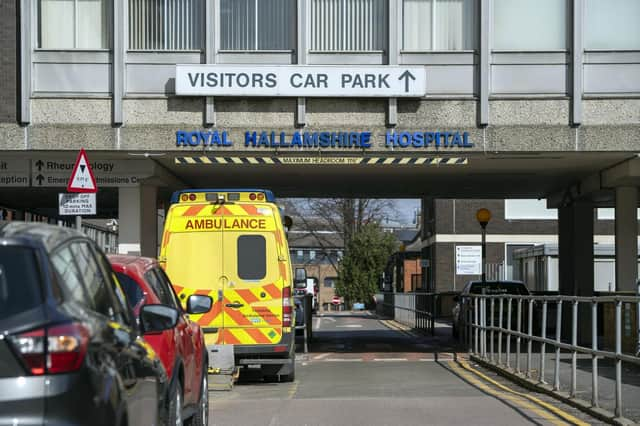'Medical negligence' investigated after much-loved woman died after epilepsy surgery in Sheffield
and live on Freeview channel 276
A woman died days after an "awful mistake" by a surgeon, an inquest has heard today (October 16).
Tracy Gambrill, aged 50, died on November 19, 2016, after she underwent brain surgery to treat her epilepsy at the Royal Hallamshire Hospital in Sheffield after the surgeon made a cut that was "too deep".
Advertisement
Hide AdAdvertisement
Hide AdAn inquest at Sheffield’s Medico-Legal Centre heard that the surgeon had not realised her head had turned, therefore changing the direction of the incisions.


Assistant Coroner Susan Evans said the inquest would look into whether gross negligence was a contributing factor in Tracy's death.
It was heard that Tracy, who was a civil servant, was diagnosed with epilepsy at the age of 10 which was drug-resistant and made her seizures 'difficult to control'. She was also suffering from non-epileptic attacks.
Tracy was referred to neurology at Sheffield Teaching Hospitals where a group of consultants decided that she was eligible for surgery - a temporal lobectomy - that would see the part of her brain causing the seizures removed.
Advertisement
Hide AdAdvertisement
Hide AdIn March 2016 Tracy had an appointment to have her surgery explained to her and the potential risks and complications, which included blindness and stroke, which could be fatal.
Sheffield consultant neurosurgeon Mr Dev Bhattacharyya, who performed the surgery on November 7, 2016, told the court "everything that happens on the operating table is my responsibility".
He recalled that Tracy had been positioned correctly on the operating table and he had checked the clamps that held her head in place were "rigid and stiff". A junior doctor was assisting him at the time.
Mr Bhattacharyya said there are no 'landmarks' inside the brain. Incisions are based on 'trajectory' which can be helped with the use of ‘Brainlab’ - a piece of equipment that uses scans of the brain to help the planning of surgery, and which was installed at the time of Tracy’s surgery.
Advertisement
Hide AdAdvertisement
Hide AdMr Bhattacharyya was unable to find the temporal lobe despite cutting deeper than usual, but said he was "confident" his incisions were being made laterally rather than medially, which is "where there are all the dangers" if cut into.
Coroner Evans asked if Mr Bhattacharyya used a piece of equipment to gauge how deep he had cut.
He said: "I’ve never had to use one before, this is the only time this has happened to me. I have done this so many times and I have never been this deep. I have no satisfactory explanation, ma’am."
After a second unsuccessful incision to find the temporal lobe, Mr Bhattacharyya said he felt "arising panic" as he realised he was "lost" inside Tracy’s brain.
Advertisement
Hide AdAdvertisement
Hide AdThe Brainlab was used in the third unsuccessful cut until Mr Bhattacharyya stepped back and realised Tracy’s head had moved, making each of his incisions medial.
"It’s an awful mistake," he said. "I sat down and I asked for help."
Another specialist consultant entered the theatre and helped Mr Bhattacharyya find the temporal lobe which was then removed.
Mr Bhattacharyya said he felt very tearful: "My mind just kept going back and thinking what have I done."
Advertisement
Hide AdAdvertisement
Hide AdA statement from Tracy’s mum and read out by her brother, Lee, said Tracy was "loved so much" and missed. She was described as "very sociable" and enjoyed travelling with her partner and looking forward to holidays together.
The family scattered her ashes in Alnmouth, Northumberland - a place she had loved and wanted to retire to with her partner.
When Tracy was diagnosed with epilepsy at the age of 10, her mum "could not have been more proud" when she took it in her stride.
The inquest continues.
Comment Guidelines
National World encourages reader discussion on our stories. User feedback, insights and back-and-forth exchanges add a rich layer of context to reporting. Please review our Community Guidelines before commenting.
